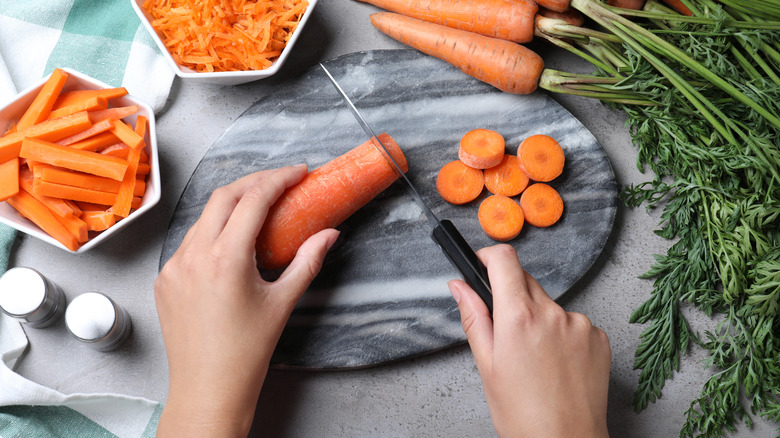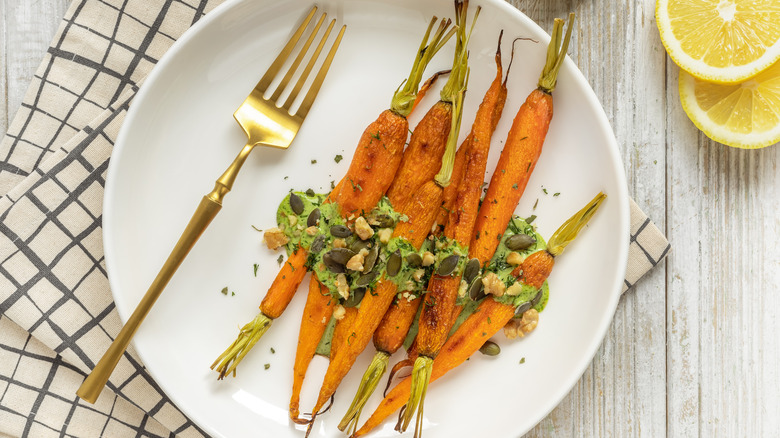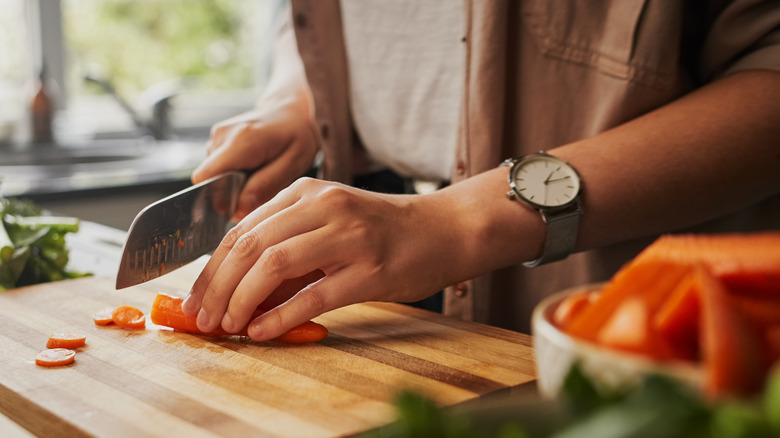Raw Versus Cooked Carrots: Which One Is Better For You?
It's a story we all know well: it's a sunny weekend afternoon at the market and you're poring over produce bins, examining each carrot and potato with scrutiny. Most of your choosing is likely organic, seasonal, and local. You haul them home and splay them onto your kitchen counter, proud of your goal of optimal eating, but then it hits you: how are you going to prepare them? In order to decide, you may consider ways the nutritional bioavailability of your veggies is impacted based on your preparation method. After all, optimal nutrition isn't just about what you eat, but also how you eat it.
Carrots are a great example of this. They naturally contain high levels of vitamins A, C, and K, calcium, iron, potassium, and fiber. Additionally, they help with vision, contain powerful cancer-fighting properties, and promote heart health (via the Cleveland Clinic). However, the availability of certain nutrients and antioxidants can depend on if they're cooked and how they're cooked. The biggest impact seems to be on carotenoids, which are powerful antioxidants, and vitamin C. Let's take a deeper look at what happens during the cooking process.
Cooking carrots can affect their nutrients
The cooking process can affect the nutrient quality of carrots on multiple levels, according to Scientific American. First, plants all contain thick cell walls that break down when we cook them. This allows the body to absorb nutrients easier than if they remained raw and bound by those tough cellular structures. When carrots are boiled or steamed, they also contain increased concentrations of antioxidants, particularly carotenoids, but that's not all.
A 2008 study published in the Journal of Agriculture and Food Chemistry showed that cooked carrots had higher levels of carotenoids, which boost the immune system. A 2003 study published in the European Journal of Nutrition found that significantly more beta-carotene was absorbed when carrots were cooked and pureed than when they were eaten raw. Many researchers agree, however, that boiling vegetables like carrots is ideal for preserving their antioxidants. Steaming is an optimal cooking method as well.
Other things to consider when cooking carrots
Don't feel the need to ditch the raw version just yet, especially if you love the taste and texture of eating carrots raw. While cooking them can increase the nutritional value in some ways, it can also potentially impact its amount of vitamins. For example, cooking carrots can reduce vitamin C levels due to the vitamin's high instability when heated (via Scientific American). If you don't want to compromise your vitamin C intake, go for the raw versions.
Some experts argue that there is a plethora of vitamin C in many other foods, so if you consistently eat a variety of fruits and vegetables, you're probably consuming enough vitamin C. If you're not getting a ton of variety but still love your carrots, you may try eating a combination of raw and cooked. You can add raw carrots to a packed lunch on some days and cooking them for dinner on others. Perhaps some of the most important considerations are how you enjoy eating them and what your personal preferences are. If you don't like the way they're prepared, you ultimately won't want to eat them at all. In order for healthy eating to be sustainable, it should also be enjoyable.



